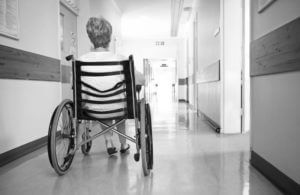Nursing Home Abuse Lawyer
As your loved ones get older, moving into a nursing home or assisted living facility may be a necessary life change to help them continue to live their life while getting assistance from qualified caregivers. While most nursing homes and long term care facilities provide excellent care that you can trust, other facilities do not have the elderly’s best interests at heart and may be investigated for nursing home abuse. Each year, elder abuse leaves many elderly individuals physically injured, emotionally scarred, financially unstable, or even worse – dead. If your loved one was the victim of this awful type of negligence, you should contact a nursing home abuse lawyer.
What Is Nursing Home Abuse?

Nursing home abuse occurs when a resident does not receive the care they need, whether physically, medically, or emotionally, or suffers harm as a direct result of the action or inactions of a nursing home facility. Things like bedsores, neglect, physical abuse, medication errors, and malnutrition are all among the most common abuses that patients have suffered at the hands of nursing homes. Whether it happens intentionally, as the result of negligence, or even due to a malicious act – all are forms of nursing home abuse and against the law. If you suspect a loved one is being abused, harmed, or mistreated while living in a nursing home or other care facility, retain the professional services of a Philadelphia nursing home abuse lawyer who can confront those responsible in a court of law. When trying to determine if a loved one has been abuse, look for one or more of the most common forms of harm.
Common Types of Nursing Home Abuse Include:
- Physical Abuse – Nursing home patients may be physically injured as part of their abuse. Hitting, kicking, shoving, excessively restraining, and more are common ways that elders are physically abused. Injuries suffered can include bruising, broken bones, bleeding, and burns.
- Emotional Abuse – Nursing home patients who are constantly subjected to verbal abuse and/or negligence are more likely to be depressed, harm themselves, and may see their physical ailments worsen. It is essential that all nursing home patients be treated with dignity and respect, as well as cared for in a timely and professional manner.
- Sexual Abuse – While nursing home patients are usually adults and can explore consensual relationships as they see fit, they can also be subjected to sexual abuse. This is especially true and tragic if the patient is physically unable to defend themselves or mentally unable to give consent.
- Financial Abuse – With identity theft on the rise, patients in nursing homes can leave their sensitive information unsecured and not know they have been victims until it is too late. Patients can also be victims of other forms of financial abuse, such as being forced to pay for care they don’t need or want, being forced to overpay, and many other dishonest practices.
What Are The Common Signs of Nursing Home Abuse?
Victims of nursing home abuse can show various signs, but some of the most common include unexplained broken bones, multiple bruises, weight loss, reluctance to see visitors, signing over homes and other forms of property without warning, large unexplained expenditures, and confusion explained as “old age” when the actual cause could be an incorrect or missing dose of medication, lack of food, and/or sudden illness.
Causes of Elder Abuse
There are, sadly, many reasons nursing home abuse takes place. These reasons are not excuses but give insight into facility issues. When there are not enough caregivers on staff, neglect can quickly begin to take place as staff gets burned out from being overworked. Forgetting one or two patients may start happening as they try to keep up with their workload. If the current staff is not properly supervised, and patient care is not appropriately documented, abuse can quickly begin and not be noticed. Many people are also just greedy and will try to take advantage of someone they feel is an “easy target.” All of these reasons are deplorable and do not protect the abuser from being held accountable.
How To Report Abuse
Individual states, including Pennsylvania, and the U.S. federal government set minimum standards for the care of residents at nursing homes and assisted living facilities. Many of these regulations are promulgated by the Health Care Financing Administration (HCFA) and are administered through the states. By knowing what is and what is not allowed, patients and their families can develop a clear understanding of which standards are not being met and use that information to establish liability against the nursing home.
Any crime – such as a physical assault or theft of property – should be immediately reported to the authorities. There are also several agencies that regulate nursing homes, including Medicare, the U.S. Department of Health and Human Services, the National Center of Elder Abuse, and the Pennsylvania Department of Aging.
Nursing Home Abuse Lawyer
If you suspect your loved one is showing warning signs of nursing home abuse, speak with the experienced legal professionals at Lopez McHugh LLP today. Time limitations apply to any potential claims, so contact us today.





